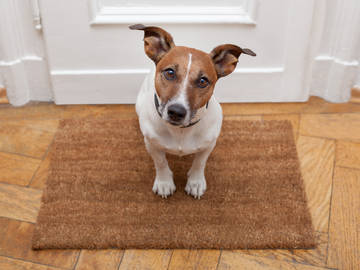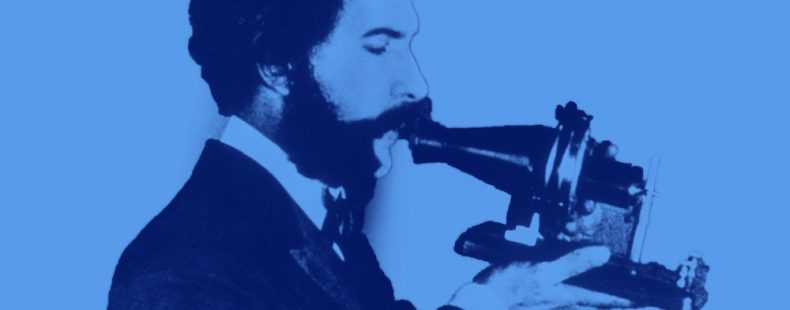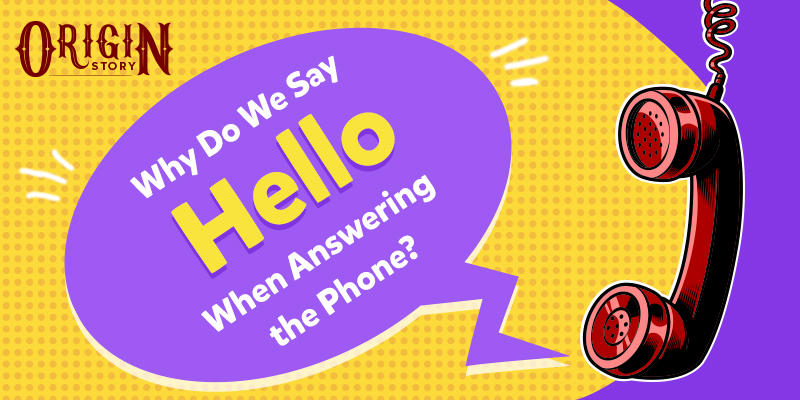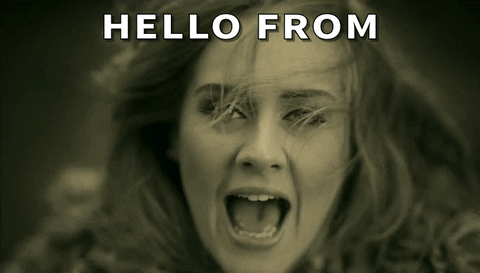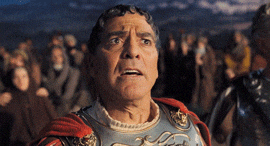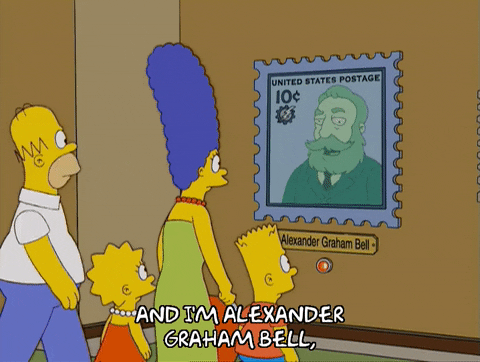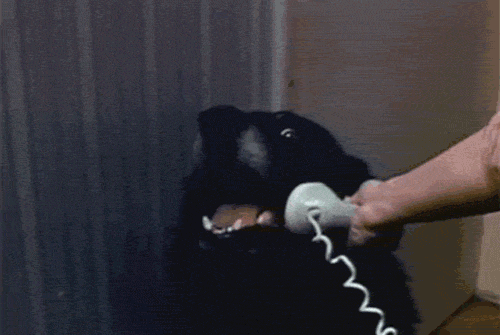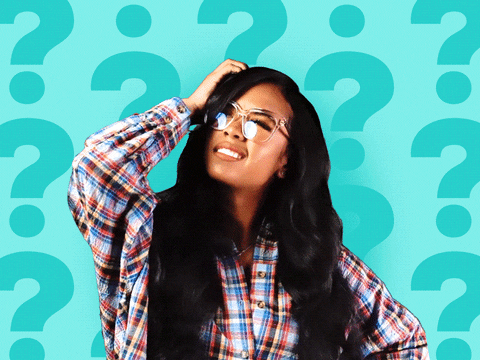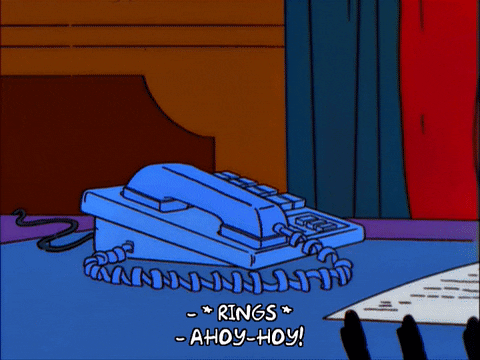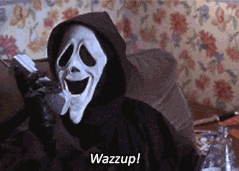From Wikipedia, the free encyclopedia
«Hello!» redirects here. For the British magazine, see Hello! (magazine).
The greeting «Hello» became associated with telephones in the late 19th century. Postcard circa 1905–1915
Hello is a salutation or greeting in the English language. It is first attested in writing from 1826.[1]
Early uses
Hello, with that spelling, was used in publications in the U.S. as early as the 18 October 1826 edition of the Norwich Courier of Norwich, Connecticut.[1] Another early use was an 1833 American book called The Sketches and Eccentricities of Col. David Crockett, of West Tennessee,[2] which was reprinted that same year in The London Literary Gazette.[3] The word was extensively used in literature by the 1860s.[4]
Etymology
According to the Oxford English Dictionary, hello is an alteration of hallo, hollo,[1] which came from Old High German «halâ, holâ, emphatic imperative of halôn, holôn to fetch, used especially in hailing a ferryman».[5] It also connects the development of hello to the influence of an earlier form, holla, whose origin is in the French holà (roughly, ‘whoa there!’, from French là ‘there’).[6] As in addition to hello, halloo,[7] hallo, hollo, hullo and (rarely) hillo also exist as variants or related words, the word can be spelt using any of all five vowels.[8][9][10]
Telephone
The use of hello as a telephone greeting has been credited to Thomas Edison; according to one source, he expressed his surprise with a misheard Hullo.[11] Alexander Graham Bell initially used Ahoy (as used on ships) as a telephone greeting.[12][13] However, in 1877, Edison wrote to T. B. A. David, president of the Central District and Printing Telegraph Company of Pittsburgh:
Friend David, I do not think we shall need a call bell as Hello! can be heard 10 to 20 feet away.
What you think? Edison – P.S. first cost of sender & receiver to manufacture is only $7.00.[11]
By 1889, central telephone exchange operators were known as ‘hello-girls’ because of the association between the greeting and the telephone.[13][14]
A 1918 fiction novel uses the spelling «Halloa» in the context of telephone conversations.[15]
Hullo, hallo, and other spellings
Hello might be derived from an older spelling variant, hullo, which the American Merriam-Webster dictionary describes as a «chiefly British variant of hello»,[16] and which was originally used as an exclamation to call attention, an expression of surprise, or a greeting. Hullo is found in publications as early as 1803.[17] The word hullo is still in use, with the meaning hello.[18][19][20][21]
Hello is alternatively thought to come from the word hallo (1840) via hollo (also holla, holloa, halloo, halloa).[22] The definition of hollo is to shout or an exclamation originally shouted in a hunt when the quarry was spotted:[23][24]
If I fly, Marcius,/Halloo me like a hare.
Fowler’s has it that «hallo» is first recorded «as a shout to call attention» in 1864.[25]
It is used by Samuel Taylor Coleridge’s famous poem The Rime of the Ancient Mariner written in 1798:
And the good south wind still blew behind,
But no sweet bird did follow,
Nor any day for food or playCame to the mariners’ hollo!
In many Germanic languages, including German, Danish, Norwegian, Dutch and Afrikaans, «hallo» literally translates into English as «hello». In the case of Dutch, it was used as early as 1797 in a letter from Willem Bilderdijk to his sister-in-law as a remark of astonishment.[26]
Webster’s dictionary from 1913 traces the etymology of holloa to the Old English halow and suggests: «Perhaps from ah + lo; compare Anglo Saxon ealā».
According to the American Heritage Dictionary, hallo is a modification of the obsolete holla (stop!), perhaps from Old French hola (ho, ho! + la, there, from Latin illac, that way).[27]
The Old English verb, hǽlan (1. wv/t1b 1 to heal, cure, save; greet, salute; gehǽl! Hosanna!), may be the ultimate origin of the word.[28] Hǽlan is likely a cognate of German Heil (meaning complete for things and healthy for beings) and other similar words of Germanic origin. Bill Bryson asserts in his book Mother Tongue that «hello» comes from Old English hál béo þu («Hale be thou», or «whole be thou», meaning a wish for good health; cf. «goodbye» which is a contraction of «God be with ye»).
«Hello, World» computer program
Students learning a new computer programming language will often begin by writing a «Hello, World!» program, which does nothing but issue the message «Hello, world» to the user (such as by displaying it on a screen). It has been used since the earliest programs, in many computer languages. This tradition was further popularised after being printed in an introductory chapter of the book The C Programming Language by Kernighan & Ritchie.[29] The book had reused an example taken from a 1974 memo by Brian Kernighan at Bell Laboratories.[30]
See also
- Aloha
- As-salamu alaykum
- Ciao
- Kia ora
- Namaste
- Shalom
- World Hello Day
References
- ^ a b c «hello». Oxford English Dictionary (Online ed.). Oxford University Press. (Subscription or participating institution membership required.)
- ^ (Anonymous). The Sketches and Eccentricities of Col. David Crockett, of West Tennessee. New York: J. & J. Harper, 1833. p. 144.
- ^ «The Sketches and Eccentricities of Col. David Crockett, of West Tennessee«. The London Literary Gazette; and Journal of Belles Lettres, Arts, Sciences, &c. No. 883: 21 December 1833. p. 803.
- ^ [1] Origin of the word.
- ^ «hallo». Oxford English Dictionary (Online ed.). Oxford University Press. (Subscription or participating institution membership required.)
- ^ «holla». Oxford English Dictionary (Online ed.). Oxford University Press. (Subscription or participating institution membership required.)
- ^ Butler, Mann, A History of the Commonwealth of Kentucky, Wilcox, Dickerman & Co., 1834, p. 106.
- ^ «Definition of HOLLO». www.merriam-webster.com.
- ^ «Definition of HULLO». www.merriam-webster.com.
- ^ «Definition of HILLO». www.merriam-webster.com.
- ^ a b Allen Koenigsberg. «The First «Hello!»: Thomas Edison, the Phonograph and the Telephone – Part 2″. Antique Phonograph Magazine. Vol. VIII, no. 6. Archived from the original on 16 November 2006.
- ^ Allen Koenigsberg (1999). «All Things Considered». National Public Radio. Archived from the original on 2009-03-09. Retrieved 2006-09-13.
- ^ a b «Online Etymology Dictionary». etymonline.com. Retrieved 28 September 2010.
- ^ Grimes, William (5 March 1992). «Great ‘Hello’ Mystery Is Solved». The New York Times. ISSN 0362-4331. Retrieved 2017-10-25.
- ^ Dehan, Richard (1918). That which Hath Wings: A Novel of the Day. G. P. Putnam. ISBN 978-1-5332-9337-4.
- ^ «hullo – Definition from the Merriam-Webster Online Dictionary». Merriam-webster.com. 25 April 2007. Retrieved 2009-09-26.
- ^ The Sporting Magazine. London (1803). Volume 23, p. 12.
- ^ «Hullo From Orkney». Forum.downsizer.net. Retrieved 2009-09-26.
- ^ Piers Beckley (23 April 2008). «Writersroom Blog: Hullo again. Did you miss me?». BBC. Retrieved 2009-09-26.
- ^ «Ashes: England v Australia – day one as it happened | Andy Bull and Rob Smyth». The Guardian. London. 16 July 2009. Retrieved 2009-09-26.
- ^ «Semi-final clash excites fans». BBC Sport. 14 April 2005. Retrieved 2009-09-26.
- ^ «Hello». Merriam-Webster Online. Retrieved 2016-02-07.
- ^ «Hollo». Merriam-Webster Online. Retrieved 2016-02-07.
- ^ Baily’s Magazine of Sports and Pastimes. Vinton. 1907. p. 127.
- ^ The New Fowler’s, revised third edition by R. W. Burchfield, Oxford University Press. ISBN 0-19-860263-4, p. 356.
- ^ Bilderdijk, Willem Liefde en ballingschap. Brieven 1795–1797 (ed. Marita Mathijsen). Uitgeverij De Arbeiderspers, Amsterdam/Antwerp 1997
- ^ «Hello». The American Heritage Dictionary of the English Language: Fourth Edition. 2000. Retrieved 2006-09-01.
- ^ «OEME Dictionaries».
- ^ Kernighan, Brian W.; Ritchie, Dennis M. (1978). The C Programming Language (1st ed.). Englewood Cliffs, NJ: Prentice Hall. ISBN 0-13-110163-3.
- ^ Kernighan, Brian (1974). «Programming in C: A Tutorial» (PDF). Bell Labs. Retrieved 9 January 2019.
External links
- Hello in more than 800 languages
- OED online entry for hollo (Subscription)
- Merriam-Webster Dictionary: hollo, hullo
It may be true that OK is the most spoken word on the planet, but hello is a good candidate for the English word that most people learn first. The word is so ubiquitous that it’s surprising how new it is: hello has only been in use for about the last 150 years of the 1000-year history of English.
Despite its popularity, ‘hello’ has only been in use for about the last 150 years.
An older term used for greeting or salutation is hail, which dates back to the Middle Ages but was still in use in Shakespeare’s time; he used it both as a greeting (“Hail to your grace“) and as an acclamation (“Hail, Caesar!”). Interestingly, this word is related to others that originally meant “health,” such as hale, health, and whole. Since hail was presumably sometimes shouted (from a horse, across a river, from a tower), it isn’t surprising that several variants are recorded, including hollo, hallo, and halloa. Another variant of this interjection has subsequently had a long life as a noun and verb: holler.
Hello is first recorded in the early 1800s, but was originally used to attract attention or express surprise (“Well, hello! What do we have here?”). But the true breakthrough for this now-common word was when it was employed in the service of brand-new technology: the telephone. Thomas Edison himself claimed to have initiated the use of hello upon receiving a phone call—which required people to address an unseen and unknown person. It was simpler and more efficient than some other greetings used in the early days of the telephone, such as “Do I get you?” and “Are you there?”
Hello obviously caught on, and spread along with the telephone. But had the actual inventor of the telephone, Alexander Graham Bell, had his way, our greetings might be very different today. For his entire life, he preferred to answer the phone with “Ahoy.”
According to the Oxford English Dictionary, hello is an alteration of hallo, hollo, which came from Old High German “halâ, holâ, emphatic imperative of halôn, holôn to fetch, used especially in hailing a ferryman”.
Contents
- 1 What did we say before Hello?
- 2 Who invented the word hey?
- 3 What is hello in Old English?
- 4 When did the word hello originate?
- 5 How did they say hello in medieval times?
- 6 Did you know facts about hello?
- 7 How did hi come from hello?
- 8 What is the meaning of hello hello?
- 9 Is it better to say hi or hey?
- 10 Where did the term Good Morning originate?
- 11 How did they say hello in the 1800s?
- 12 How did the Anglo Saxons say hello?
- 13 What does Hello mean in Islam?
- 14 What does Why hello there mean?
- 15 How did knights say hello?
- 16 How did people greet each other in Elizabethan times?
- 17 How do you say goodbye in Old English?
- 18 Is Hi short for hello?
- 19 What does Mr Burns say when he answers a phone?
- 20 Is hello a universal word?
What did we say before Hello?
Prior to ‘hello’ coming along the predominant greetings would have been, ‘good morning’, ‘good afternoon’, ‘good evening’, etc. The word ‘hullo’ existed, but it was used as an expression of surprise – you’ll find it a lot in Conan Doyle’s ‘Sherlock Holmes’ stories. Hello came about because of the telephone.
Who invented the word hey?
Hi and hey (according to all sources) have their origins in the Germanic languages where many modern cognates exist, usually as hei or hej.
What is hello in Old English?
The Old English greeting “Ƿes hāl” Hello! Ƿes hāl! (
When did the word hello originate?
Hello is first recorded in the early 1800s, but was originally used to attract attention or express surprise (“Well, hello! What do we have here?”). But the true breakthrough for this now-common word was when it was employed in the service of brand-new technology: the telephone.
How did they say hello in medieval times?
In medieval England, “Hail fellow” was a common greeting. By the 16th century this had morphed a bit into the more elaborate form “Hail fellow, well met.” “God save you” would also have been a conventional greeting.
Did you know facts about hello?
The inventor Thomas Edison is the reason why people use hello. He was surprised by a phone and expressed this with a misheard “hullo”. Hello was first used in print in 1833 and became popular from the 1860s. The word “ahoy” was originally intended to be the way to answer a telephone, but “hello” stuck.
For example, the word hallo demanded that the listener come to a stop or cease what he or she was doing. It was also used to spur on hunting dogs.Hello as used as an everyday greeting is recorded since at least the 1850s. Because it’s such a common word, we might have expected that greeting to be recorded earlier.
What is the meaning of hello hello?
: an expression or gesture of greeting —used interjectionally in greeting, in answering the telephone, or to express surprise hello therewaved hello.
Is it better to say hi or hey?
Hi is a word used to greet people of all ages. It is considered more formal than Hey though somewhat less formal than Hello. This is the reason why it has become acceptable among people of all classes.
Where did the term Good Morning originate?
A greeting said when parting from someone in the morning. Etymology: From Middle English gud mornynge (also as goode morne, gode morne), from Old English *gōdne morgen (“good morning”) , an ellipsis for an expression such as “I wish you a good morning”, equivalent to good + morning.
How did they say hello in the 1800s?
The use of ‘hello’ was suggested by Thomas Edison. The phone’s inventor Alexander Graham Bell, however, preferred the use of the nautical terms ‘ahoy’ or ‘ahoy-hoy’ as used to hail ships.
How did the Anglo Saxons say hello?
A collection of useful phrases in Old English, the version of English that was spoken in England from about the 5th to the 11th century.
Useful phrases in Old English.
| English | Ænglisc (Old English) |
|---|---|
| Hello (General greeting) | Wes hāl (sg) Wesaþ hāle (pl) Wesaþ hāla (pl/f) |
| How are you? | Hú meaht þú? Hu eart þú? |
What does Hello mean in Islam?
مرحبا
1. مرحبا (Marhaba) – “Hello/Hi” How do you say “hello” in Arabic? The answer is مرحبا (Marhaba).
What does Why hello there mean?
The ‘why’ is just an exclamation when used like this, just like ‘Ah, hello there’ or ‘Oh, hello there’, it just indicates a small measure of surprise, pleasant surprise.
How did knights say hello?
Greetings and Goodbyes
Good morrow = Hello/Good morning. Well met! = Nice to see you! How met!
How did people greet each other in Elizabethan times?
You can use: Good morning Give you good morning Good morning Good morrow Good day (or morning, afternoon, evening) God give you a good day Good day (or morning, afternoon, evening) Good day; Good den Good afternoon or evening Good even; Good e’en Glad to see you! Well met!
How do you say goodbye in Old English?
Just to drive home the point, the Old English Wes hāl could be used to say ‘goodbye’ as well as ‘hello’. The equivalent would be if we were to use hi when we leave as well as when we arrive. The idea may seem odd to us, but of course the Italian ciao is used in just this way . . . to mean both ‘hello’ and ‘goodbye’.
Is Hi short for hello?
Hi is defined as a standard greeting and is short for “hello.” An example of “hi” is what you say when you see someone. interjection.
What does Mr Burns say when he answers a phone?
In response to a Twitter post from the Daily Simpsons History account that revealed that Mr Burns answers the phone with “ahoy-hoy” as a nod to Alexander Graham Bell’s original suggestion for how to answer the telephone, Weinstein confirmed that that was indeed the case. “This is it!
Is hello a universal word?
This Is the World’s Most Universal Word—It’s Not “Hi”
After analyzing 31 languages derived from 16 distinct language families, linguist N.J. Enfield found that each had a word that sounds like “huh” and means the same thing.
While we say «hello» every day, most of us don’t know where the word actually comes from.

Hello! There’s a good chance you’ve used this word at least once today. You probably said it to your neighbor in the elevator, to the barista before ordering, or maybe to your coworkers when you came into work. There’s a reason why «hello» is the first word you learn when studying a new language: With it, you can introduce yourself, get someone’s attention, and signal that you’re friendly.
Despite the word’s popularity, though, you probably don’t know where «hello» actually comes from. Has it always been a greeting? Was another word used in its place before? Who even came up with it—and why?
Well, if you’ve ever been curious about the origin of «hello,» we have some answers for you. This might come as a bit of a surprise considering how much people use it every day, but the word «hello» has only been around for about 150 years. The first record of the word goes back to the 1800s, when it was used less as a greeting and more as an expression of surprise.
But what were people saying before the 1800s to greet each other? A common word people used all the way from the Middle Ages through Shakespeare’s time was «hail.» It carried a rather benevolent undertone, as it was related to words like «health» and «whole.» We may not be using it as a greeting in the 21st century, but we still use a variation of it in our daily language: «holler.»
The widespread use of «hello» as a greeting is thanks to Thomas Edison. After Alexander Graham Bell invented the telephone in the late 1800s, people needed a way to answer the new device, and Edison took it upon himself to come up with a salutation. When he did, The New York Times recalls that he wrote an enthusiastic letter to a friend named Mr. David on August 15, 1877, explaining his solution.
«Friend David,» wrote Edison, «I don’t think we shall need a call bell as Hello! can be heard 10 to 20 feet away. What do you think? EDISON.»
Graham Bell did not like Edison’s idea one bit. He preferred the word «ahoy,» which came from the Dutch greeting word «hoi.» (Yes, it was mostly a nautical term back then, too.) And yet, when the first telephone exchanges equipped by Edison were set up all across the United States, the operating manuals that came with them included two greeting options: «Hello» or «What is wanted?» Likely because «What is wanted?» is quite lengthy, by the 1880s, «hello» was the common and preferred greeting.
Next time someone asks you about the origin of «hello,» you can explain to them that it goes all the way back to Alexander Graham Bell and Thomas Edison (and that «ahoy» almost ended up being the de facto greeting—yikes).
Published October 13, 2020
We use hello several times a day to greet people or attract attention. But as prevalent as the word is, it is relatively new.
Where does hello come from?
While use of the term hello dates back earlier, it isn’t recorded with this exact spelling until the 1800s. Hello is considered a variant on a number of other similar words—like hallo, holla, and hollo—that were used to hail and shout to gain attention and recorded prior to the 1800s.
For example, the word hallo demanded that the listener come to a stop or cease what he or she was doing. It was also used to spur on hunting dogs. Hallo comes from the Middle French holá (from ho! “ahoy” and la “there”), so you could say that when you say hello, you’re actually saying “Ahoy there!”
Amazingly, there are countless variations of these words, including: halloo, halloa, halow, hillo, holler, hollo, holloa, hollow, and hullo. Some of these may sound more familiar than others.
Hello as used as an everyday greeting is recorded since at least the 1850s. Because it’s such a common word, we might have expected that greeting to be recorded earlier. This spelling is considered an Americanism, while hullo is a variant that is more commonly seen in Great Britain.
A more modern use of the word hello calls into question the common sense or comprehension of the person being addressed. For example, “You’re actually going to eat that rotten peach?! Hello!”
Why do we answer the phone with hello?
When the telephone was invented, Alexander Graham Bell wanted people to use the word ahoy as a greeting. Supposedly his rival Thomas Edison suggested hello, while Bell stubbornly clung to ahoy, and well—you know which one stuck around. (Interesting trivia: hello-girls was the name for the central telephone exchange operators.)
What about other greetings?
Hi is equivalent to hello, but it is considered a little bit more informal in tone. In fact, it was recorded a lot earlier than hello. Hi developed from the Middle English hy, similar to hey and ha. Essentially, these are all terms used to call attention—they’re short and easy to say—that evolved into the greetings we use today.
WATCH: Why Are There So Many Ways To Say «Hi»?
As for the upbeat greeting howdy, it was first recorded as a contraction of “how do you do” in 1632. An earlier version comes from “how do ye.”
So when you greet someone, you now know that you can choose from the modern-day equivalent of “Ahoy, there!” or “How do ye!” Of course, you could dip into your arsenal of words from the 1900s and use wassup, which is short for (what else?) “What’s up?”
Every hello brings with it an inevitable goodbye. Find out why we say goodbye in the first place and the numerous other ways you can bid farewell.
Hello?
What do you say when you answer the phone? If you’re like most people, you say «hello.» It’s such a common, everyday word. But where did it come from?
The word hello has a surprising history. Its origins can be traced back to the 1830s, and it wasn’t originally used as a greeting. In fact, the first published use of «hello» was in 1827, and it was mainly used to attract attention or express surprise. It wasn’t until the telephone arrived that hello became hi. Thomas Edison is credited with putting hello into common usage, and he urged people who used his phone to say it when they answered. His rival, Alexander Graham Bell, thought the better word was «ahoy.»
Ahoy?
«Ahoy,» it turns out, has been around longer than «hello.» It was first used in the 1500s as a cry to attract attention. Sailors would shout «Ahoy!» when they saw land, or when they were approaching another ship. «Ahoy» comes from the Dutch word «hoi,» which means «hello.» Bell actually felt so strongly about using the phrase «Ahoy» that he used it for the rest of his life.
That is all
The origins of «goodbye» can be traced back to the early 1800s, and it was originally used as a parting phrase. In the 1830s, people originally began using «That is all» as a farewell greeting, and it soon became commonplace. It first became popularized by the telephone companies. Today, «goodbye» is the most common way to sign off on the phone.
So there you have it! The next time you say «hello» or «goodbye,» you can think about the surprising history behind these two simple words. From its humble beginnings as a cry to attract attention, to their current uses as a greeting or farewell, hello and goodbye have come a long way. Next time you answer the phone, take a moment to think about the history of the word you’re using. Bye for now!
Сегодня телефон стал неотъемлемой частью нашего быта. Еще недавно он казался чудом, способным воспроизводить голос человека на значительном удалении. Сегодня же телефон – мобильный многофункциональный мультимедийный «комбайн». Конечно же, основной своей функции он не лишился, пусть связь и стала цифровой, получив видео-сопровождение.
♥ ПО ТЕМЕ: Как появилось слово Спам (Spam): удивительная история происхождения термина.
Нетрудно догадаться, что говорит большинство, принимая телефонный звонок: «Алло!» (алё). Это слово стало настолько привычным, что получило и новые смыслы, порой жаргонные. Откуда же оно появилось, и что изначально означает? Скажем честно, мало кто это знает.
В далекие времена, когда телефония только внедрялась в жизнь человека, каждый ее пользователь должен был следовать вполне четким прописанным правилам. Изначально телефон был далеко не массовым инструментом – его могли позволить себе только самые богатые и влиятельные люди. Именно поэтому тогда каждое улучшение технологии передачи речи на расстоянии становилось событием, приближавшим телефонию к широким массам.
И хотя изобретателем телефона считается Александр Белл, развитием этой технологии, ее улучшением и популяризацией занимался знаменитый американский изобретатель Томас Эдисон. Это он и обозначил то самое популярное слово, с которого теперь начинаются телефонные разговоры в половине стран планеты.
♥ ПО ТЕМЕ: Попугай повторяет рингтон iPhone (видео).
Откуда появилось слово «Алло»?
В 1877 году Эдисон переписывался с президентом одной из телеграфных компаний. Речь шла о введении четких правил при использовании нового устройства для приема и передачи голосовых сообщений. Сам Эдисон предлагал начинать разговор со слова «hullo». А вот у изобретателя телефона, Александра Белла, была другая точка зрения. Он считал уместным в качестве начала разговора использовать слово «ahoy». Именно таким английским словом приветствуют друг друга команды встретившихся в море кораблей (его кричали в рупор на другой корабль с тем, чтобы начать разговор). В результате вариант Эдисона прижился, им мы сегодня и пользуемся. Наше «алло» является русифицированным «hullo». Интересно, что в Россию слово попало даже не из Америки напрямую, а транзитом через Европу. Там заморское «hullo» подверглось обработке диалектами, породив как «алло», так и «алё».
Но идея Эдисона нашла понимание не во всех странах. Например, в Испании разговор начинается с «дига» (говорите), в Японии «моси-моси» (говорю-говорю), а в Китае – «вэй» (эй), в Корее – «ёбосэё» (сокращение от «ёги посэё» («посмотрите сюда»)), арабы же предпочитают «мархаба» (привет), в Израиле – «шалом» (мир).
Смотрите также:
- Какого размера метеорит способен уничтожить человечество.
- Голландия и Нидерланды: какая разница и как правильно называть?
- Самые глубокие ямы в мире.
What word is more ever-present in the English language as “hello?” Sure, ‘mama’ or ‘dada’ might often be an infant’s first word. But, ‘hello’ is learned quickly thereafter. You can hardly go for a stroll without uttering the word at least once. Your phone rings and it’s an unknown number. How do you answer? Simple. You tap the ‘answer’ button, and say “Hello.”
There’s a reason why “hello” is the first word you learn when studying a new language: With it, you can introduce yourself, get someone’s attention, and signal that you’re friendly.
Despite the word’s popularity, though, you probably don’t know where “hello” actually comes from. Has it always been a greeting? Was another word used in its place before? And why do we say ‘Hello’ when answering the phone?
Well, the last time we told you the fascinating story behind the origin of “OK”.
Today we are back with another origin story for those of you who have been curious about the history of “Hello”!
“Hello” History!
Credit: Giphy
Let’s talk a little etymology – you know, the study of words and how their meanings have changed throughout history.
This might come as a bit of a surprise, but the word “hello” (or at least using it as a greeting) is about as new as the invention of the telephone itself. In addition, the word “hello” was never intended to mean the “hi” we use it for today at all.
According to the Oxford English Dictionary, the first documented use of “hello” was in 1827, less than 200 years ago.
Back then it was used in two ways and neither of them was a friendly greeting. The first use was as an expression of surprise, as in the phrase, “Hello, what do we have here?!” The second was to get sudden attention, as in “Hello, what do you think you’re doing?!” This would be comparable to today’s “hey you!”.
What Was The Greeting People Used Prior To Hello?
If hello’s popular use only came about as recently as the telephone, what could one be expected to say as a greeting before then?
During the 17th Century in America, pilgrims would typically say “Good morrow,” “How now?” “How do you fare” or “What cheer?” in place of “Hi, how are you?” But that’s quite a disconnect from hello.
The word closest in similarity to hello that was used by people all the way from the Middle Ages through Shakespeare’s time was “hail.” As in, ‘Hail, Caesar!’ This is traced to the Old Norse word, heill, which comes from the word’s meaning “health.”
Health or holiness-either seems like something quite friendly to wish upon someone you are greeting, right?
But the big question remains. But why do we say hello when answering the phone?
Common Myths Around Why We Say ‘Hello’ On Phone
Credit: Giphy
First, let’s rid ourselves of myths we may have picked up over the internet. Rumor has it that the standard greeting came about because it was the name of Alexander Graham Bell’s girlfriend at the time of patenting the invention. The story goes that she later married the inventor. Would this mean that his wife’s proper name was Hello Bell? Surely not!
Others suggest that it was a girlfriend that Alexander Graham Bell was honouring when choosing the go-to phrase for answering a call on the telephone. This girlfriend is said to have been named Margaret Hello. Supposedly, a declaration of love is why we say hello when answering the phone.
There is no merit whatsoever to this silly story, as interesting as it may sound. This rumour isn’t based on any historical facts. Someone just made it up!
What Was Said During The First Phone Call?
Credit: Giphy
If you’re wondering what was said as a greeting to the first person that Alexander Graham Bell called, you may be a bit disappointed. Because, in fact, there was no need for a greeting. There wasn’t a ring. The first call was rather brief:
“Mister Watson, come here – I want you.”
So Why Do We Say Hello When Answering The Phone?
Credit: Giphy
Hello began catching on as a greeting through the 19th century, but it wasn’t until the telephone was invented that its future was sealed.
Though we credit Alexander Graham Bell as the inventor of the telephone (whether or not he was, is still up for debate), a different inventor is credited with coining the typical phone greeting. Who? Thomas Edison!
You see, the phone wasn’t intended to be a device that rang. It was expected to be a line of business communication between two parties that was left as an open line. If the caller wanted the person on the other end of the line to know they would like to speak, some sort of greeting would need to occur. Graham Bell had suggested an older maritime greeting: ‘Ahoy!’ In fact, he felt so strongly about “ahoy” that he used it for the rest of his life.
We wonder how would it sound if we say ‘Ahoy’ while answering the calls now! Credit: Giphy
However, his rival, Thomas Edison thought the better word was “Hello” and he urged the people who used his phone to say “hello” when answering.
When the first telephone book was printed in New Haven, Connecticut, USA in 1878, it included a “how to” section as well as tips on phone etiquette. It informed the readers that one should initiate a telephone conversation with “a firm and cheery ‘hulloa.’” By 1880 Edison’s preferred hello had won out.
The Future Of Hello
Will the legacy of using “hello” as the most-used greeting continue in (and perhaps after) the age of cellphones? In a generation whose most oft-used text greeting is the more casual “hey,” or the more fashion-forward “Whassup”, will “hello” be as lost to the archives as “ahoy”? Maybe not.
For programmers beginning to learn computer languages, the first thing they use is a simple “Hello, world!” program. It is simply a display device being used to convey the forthright message, “Hello, world!” onto the computer screen. This has been a programming protocol since at least 1972. With the advent of wireless landlines, then cell phones, and then smartphones, many popular slang greetings have come and gone. “Hello” is a classic, if not universal, way in which to greet the world, and we hope it stays.
So the next time someone asks you about the origin of “hello,” you can explain to them that it goes all the way back to Alexander Graham Bell and Thomas Edison (and that “ahoy” almost ended up being the de facto greeting).
We hope you enjoyed learning something new today. Tell us which part of this Origin Story did you find most fascinating? What other origin stories would you like to read about? Tell us in the comments below.
Hello in different languages:
There are thousands of languages being spoken by people around the word and saying “Hello” is one of the most basic and important form of greeting someone in each of them. Here is how you say “Hello” in ten different languages. Who knows, it might come in handy with you are touring the world.
| Hello in Spanish | hola |
| Hello in French | bonjour |
| Hello in German | guten tag |
| Hello in Italian | salve |
| Hello in Chinese | nǐn hǎo |
| Hello in Portuguese | olá |
| Hello in Arabic | asalaam alaikum |
| Hello in Japanese | konnichiwa |
| Hello in Korean | anyoung haseyo |
| Hello in Russian | Zdravstvuyte |
Also read, about How did telephones go from wired to wireless


